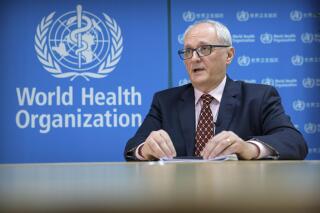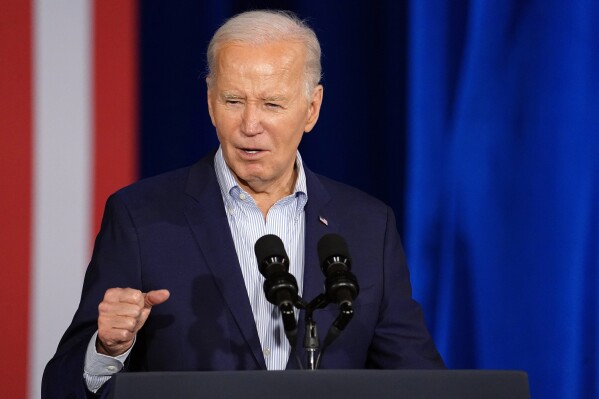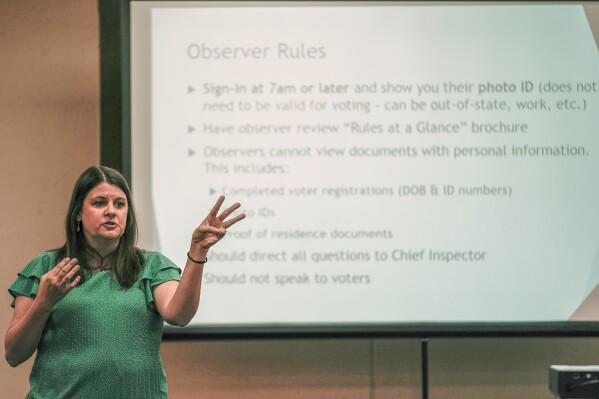Posts misrepresent research on multiple sclerosis and COVID-19 vaccines found in WHO database

FILE - In this Thursday, Jan. 23, 2020 file photo, Dr. Gauden Galea, the World Health Organization representative in China, speaks during an interview at the WHO offices in Beijing. The Associated Press on Friday, May 26, 2023 reported on false claims that the WHO has admitted in a study that the COVID-19 vaccine causes multiple sclerosis. (AP Photo/Mark Schiefelbein)
CLAIM: The World Health Organization admitted that COVID-19 vaccines can lead to multiple sclerosis.
AP’S ASSESSMENT: False. A database on the WHO website includes an abstract for a conference presentation about research that examined two recent cases of MS. The research found there might be a potential link to COVID vaccines, but did not definitively conclude the shots triggered the neurological disease, according to the global health agency and multiple sclerosis experts. One of the research authors also stressed COVID infection carries a higher risk of triggering MS than the COVID vaccine.
THE FACTS: Social media users are sharing a post that suggests the WHO has found COVID vaccines can lead to multiple sclerosis.
Many are sharing a screenshot of recent research titled: “Covid-19 vaccination can induce multiple sclerosis via cross-reactive CD4+ T cells recognizing SARS-CoV-2 spike protein and myelin peptides.”
“Look what the WHO is admitting to…” wrote one user on Twitter who shared the screenshots.
“HOLY. MOTHER. OF. GOD. From the WHO site itself,” wrote another Twitter user who shared the screenshots in a post that was retweeted more than 11,000 times as of Friday. Similar posts were also shared on Instagram.
MS is a potentially disabling but rarely fatal neurological disease that occurs when immune system cells mistakenly attack the protective coating on nerve fibers, gradually eroding them.
The exact cause of the chronic ailment is unknown, but it afflicts more than one million Americans and causes symptoms ranging from numbness and tingling to mood changes, memory problems, pain, fatigue, blindness and even paralysis, according to the National Multiple Sclerosis Society.
The screenshots circulating on social media show an abstract from research that can be found on its Global COVID-19 Research Database. But it’s not a paper that was produced or officially endorsed by the WHO.
The abstract, by researchers at the University Hospital of Zürich in Switzerland, was published in 2022 in the Multiple Sclerosis Journal. It examined two cases of multiple sclerosis that began in close proximity to the patients receiving mRNA-based vaccinations and concluded they could have been induced by the COVID-19 inoculations, experts told The Associated Press.
The Geneva-based public health agency also cautioned that the research is limited and additional studies are needed to confirm the findings.
“Case-control studies, due to their typically retrospective nature, can be used to establish a correlation between exposures and outcomes, but cannot establish causation,” the agency wrote. “These studies simply attempt to find correlations between past events and the current state.”
Roland Martin, a neurology professor at the University of Zurich who was one of the authors of the research, said the work shows that the vaccine was related to the onset of MS, at least in the two patients studied.
But he conceded that the wording of the abstract is “probably too strong” since there are many other possible causes for MS, including genetic predisposition and environmental factors.
“This issue is very important, and I hope that the usefulness of the vaccines will not be questioned by our observations as there is no doubt that the risks for triggering MS are higher with the natural infection based on current data,” he wrote in an email Sunday.
Julie Fiol, an associate vice president at the National Multiple Sclerosis Society, agreed, stressing the research does not prove the coronavirus causes MS, as some claim online.
“To prove cause and effect, a different type of study (experimental) would need to be conducted, with very large numbers of people, from multiple locations,” she wrote in an email. “Cause and effect cannot be determined by an observational study (case report).”
Fiol also noted that the abstract’s introduction makes it clear that other research has found that the type of nervous system damage caused by MS occurs more often after COVID infection than after COVID vaccination.
She also noted that a study published last yearin the Journal of Neuroimmunology similarly looked at a small number of cases of MS that developed following a COVID shot.
But the researchers with the Cleveland Clinic’s Neurological Institute in Ohio determined that “causality of vaccination and onset of MS cannot be determined” based on the five cases they examined, recommending further research.
Camille Gamboa, a spokesperson for Sage, the California-based publisher of the Multiple Sclerosis Journal, stressed the research isn’t a published study, but rather an abstract published along with all others presented at the European Committee for Treatment and Research in Multiple Sclerosis conference last year.
“Conference abstracts are routinely published for informational purposes and merely provide a report of the papers and posters presented at a particular conference,” she explained in an email. “They often represent incomplete research and are used to get feedback or find collaborators. They are not peer reviewed in any manner, and publication of an abstract does not equate to publication of the paper or poster presented in the conference session.”
Stephen Hauser, a professor in the neurology department at the University of California in San Francisco, said that the researchers involved are recognized leaders in global MS research.
But he said it’s “quite dangerous” to draw conclusions based on limited research.
“They have led the world in understanding how exposures to a variety of viruses and bacteria could lead to misdirected immune responses against brain tissue,” Hauser wrote in an email, referring to the researchers. “This very preliminary report adds to that body of work, and suggests that proteins from SARS-CoV2 is another in the growing list of common pathogens that might trigger or amplify autoimmunity.”
___
This story has been updated to include a comment from one of the study’s authors.
___
This is part of AP’s effort to address widely shared misinformation, including work with outside companies and organizations to add factual context to misleading content that is circulating online. Learn more about fact-checking at AP.


